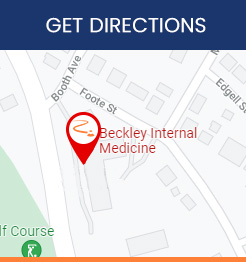Diabetes Management Specialist in Beckley, WV
Diabetes is a condition where the body fails to produce or use insulin efficiently. The two potential treatments are medication and lifestyle modifications. To control diabetes, it is important to regulate blood pressure, cholesterol, and glucose levels. Diabetes can be managed by maintaining a healthy diet, engaging in regular physical activity, and keeping blood sugar levels within the normal range. At Beckley Internal Medicine Dr. Elizabeth Thompson Nelson, MD, and her team of medical professionals have years of experience and plenty of expertise in helping people with diabetes and overcome the challenges of their condition! For more information, contact us or schedule an appointment online. We are conveniently located at 2401 South Kanawha Street, Ste 100, Beckley, WV 25801.
in Beckley, WV,


Table of Contents:
What is the best treatment for diabetes?
What are the stages of diabetes?
Can diabetes go away?
What is usually the first sign of diabetes?
How would you know if you have diabetes?
How do you get diabetes?
How do you manage diabetes?
According to the Centers for Disease Control and Prevention (CDC) over 34 million Americans have diabetes (around 1 in 10) with type 2 diabetes accounting for between 90 and 95%. Symptoms and treatment can be similar for both types, but the important difference is that in type 1 diabetes, the body doesn’t produce insulin and in type 2 (the most common) the body doesn’t use it properly
Treatment for diabetes is constantly evolving and patients who have either just been diagnosed or have lived with the condition for a while should stay educated and informed about the latest technologies, medical therapies and treatment approaches.
The two ways of treating diabetes are regular blood testing and medications.
Blood sugar testing
– Smart insulin pen
A new innovation in blood sugar management, the smart insulin pen is a reusable injector pen with an instinctive smartphone app that calculates and tracks doses and gives helpful reminders, alerts, and reports.
– Glucose meters
The two main types of glucose monitors are the standard ones that use a drop of blood and continuous glucose monitors (CGMs) that check the blood glucose regularly throughout the day or night by way of a sensor placed on the skin.
– Insulin pumps
An insulin pump is a piece of equipment that is attached to the body, programmed to deliver insulin and works by closely mimicking the body’s natural release of insulin.
Oral medications
Type 1 diabetics will need insulin but for those with type 2 diabetes treatment plans can change depending on the individual. Some people can manage the disease with healthy eating and exercise, or with medication, and – in some cases – insulin.
To better understand the stages of diabetes it is helpful to know what causes the disease. Type 1 diabetes is caused by the body’s immune system mistakenly destroying beta cells in the pancreas. Beta cells are responsible for insulin production and without them the pancreas is unable to make insulin. Type 2 diabetes occurs when the beta cells produce the insulin, but the body is unable to use it efficiently.
According the American Diabetes Association the stages that mark the progression diabetes are:
Type 1 diabetes
– Pre-Stage 1 – analysis is used to help identify genes commonly associated with type 1 diabetes.
– Stage 1 – autoantibodies (antibodies produced by the immune system that attack the body’s own proteins) start attacking the beta cells in the pancreas; blood sugar levels remain normal, and no symptoms are present.
– Stage 2 – more beta cells are destroyed, and low insulin and glucose intolerance leads to rising blood sugar levels. Although more serious, there are still no symptoms.
– Stage 3 – there is a significant loss of beta cells causing symptoms that result in a type 1 diabetes diagnosis such as excessive hunger or thirst, blurry vision, severe fatigue, frequent urination and unexplained weight loss.
Type 2 diabetes
– Stage 1 – prediabetes. Muscle, liver and fat cells become insulin resistant; the pancreas produces more insulin to keep blood sugar levels within normal range.
– Stage 2 – also prediabetes. Blood glucose levels remain higher than normal, but not high enough for a diabetes diagnosis.
– Stage 3 – blood sugar levels continue to be abnormally high, leading to a diagnosis of type 2 diabetes.
– Stage 4 – the most serious complications can occur such as albuminuria (protein in the urine), chronic kidney disease, coronary artery disease, heart failure, peripheral neuropathy or stroke.
There is no cure for either type of diabetes, but those with the disease can see remission by making certain lifestyle changes. Once a person receives a diagnosis of diabetes it means that the beta cells have been injured in addition to the fact that the underlying genetic factors making a person susceptible to the disease are still present. So the disease can enter a state of ‘dormancy’ if environmental factors are favorable but there is always the potential for it to resurface.
The most common early signs of diabetes are frequent urination, extreme thirst, and persistent hunger.
In people with type 1 diabetes, the onset of symptoms can be very abrupt. With type 2, they tend to develop more gradually, and sometimes there are either no signs at all or they are so mild that they go unnoticed.
Typical symptoms of diabetes include:
– Urinating often
– Feeling very thirsty
– Excessive hunger – even though eating
– Extreme fatigue
– Blurry vision
– Cuts/bruises that are slow to heal
– Weight loss – even though eating more (type 1)
– Pain, tingling, or numbness in the hands and/or feet (type 2)
Although types 1 and 2 diabetes have many similarities, the cause of each is very different. There are, however, two factors that are key to both. Firstly, a predisposition to the disease is inherited and secondly, something in the environment triggers it.
Most people with type 1 diabetes inherited risk factors from both parents and environmental triggers are thought to include cold temperatures, viruses and early childhood diet.
Type 2 diabetes has a stronger connection to family history and genetics. Race can also play a role. Environmental factors include lifestyle as families often have similar eating and exercise habits.
Both types of diabetes can be managed by maintaining a healthy lifestyle that includes regular exercise, healthy eating, losing weight, taking prescribed medications, and blood sugar monitoring.
If you would like to know more about diabetes, its causes and treatment, contact Beckley Internal Medicine today! We are located in Beckley WV and serve patients from the surrounding areas. Call or book an appointment online – we look forward to meeting you! We serve patients from Beckley WV, Stanaford WV, Lester WV, Baylor WV, Bradley WV, and Beaver WV.


Additional Services You May Need
▸ Internal Medicine
▸ BioTE
▸ Medical Weight Loss
▸ Physical Exams
▸ Bio Identical Hormone Replacement Therapy
▸ Pelvic Exams
▸ PAP Smears
▸ Family Planning
▸ Diabetes Management
▸ Hyperlipidemia





